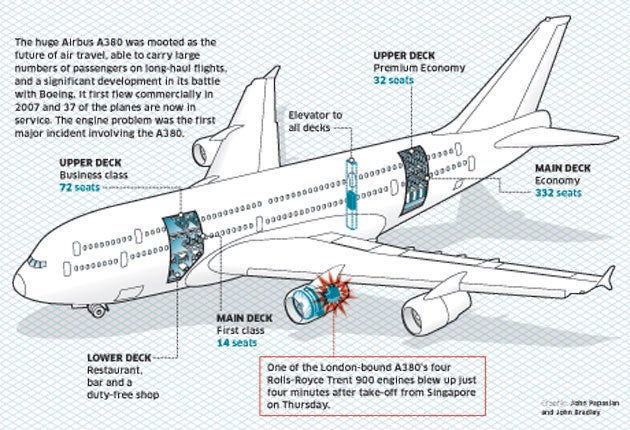Rolls-Royce value falls by £1.2bn after jet accident
The turbulence is likely to be severe

Rolls-Royce, one of Britain's last remaining manufacturing giants, was facing tough questions over the safety of one of its jet engines last night amid suggestions a design flaw may have caused one to explode.
The company saw around £600m wiped off its share value yesterday, after a similar fall on Thursday, as it continued to investigate the possible problems with the Trent 900 engine, used in 20 of the 37 new Airbus superjumbos.
Two British investigators have been dispatched to help examine the emergency landing of the Airbus A380, which was heading to Sydney from London, because of the firm's involvement in the dramatic incident.
Debris was sprayed over the Indonesian island of Batam on Thursday, when one of the Qantas-owned plane's four engines blew up four minutes after take-off.
While the experts from the Air Accident Investigation Branch (AAIB) will take a special interest in Rolls-Royce's role in the failure, they are not expected to file a separate report to Philip Hammond, the Transport Secretary.
Germany's Lufthansa chose to keep its fleet of the planes flying, while Singapore Airlines removed its A380s from service for less than 24 hours after carrying out safety checks.
Rolls-Royce was a big loser on the stock exchange, seeing the value of its shares fall by 3.5 per cent after Qantas chief executive Alan Joyce suggested that faulty engine design could be behind the explosion. Shares had already fallen by 5 per cent a day earlier.
"We believe this is probably most likely a material failure or some type of design issue," Mr Joyce said. "We don't believe this is related to maintenance in any way." He revealed the engines had been inspected by Rolls-Royce since they were installed.
The Australian Transport Safety Bureau's (ATSB) head of aviation safety, Ian Sangston, said "a number of abnormal engine indications" had appeared in the plane's second engine shortly after it took off.
Safety checks on the airline's other five A380 planes kept them grounded last night. However, the ATSB said it thought they will be back in the air in days rather than weeks.
Rolls-Royce, which employs around 11,000 workers at its Derby manufacturing site, refused to expand on an initial statement, in which it said it would be "inappropriate to draw any conclusions" at what was a "very early stage" of the investigation.
The firm was dealt another blow yesterday when a second Qantas plane was forced to make an unscheduled landing because of an apparent problem with one of its engines.
The Boeing 747-400, fitted with four Rolls-Royce RB211-524G-T engines, headed back to Changi Airport in Singapore shortly after taking off. However, it began its flight successfully three hours later.
Last August, Europe's air safety watchdog warned airlines about abnormal wear inside the Trent 900 engines installed on the A380s. In January, it issued a further directive on the issue. Qantas said it was aware of the alert and had dealt with it.
"Airworthiness directives are there to try and improve the performance of...how the maintenance is taking place – it is not unusual," Mr Joyce said. "If it was unusual we would be signalling that." Another new Rolls-Royce engine, a Trent 1000, experienced an "uncontained failure" during testing over the summer.
Delivery of the engines for use in Boeing's Dreamliner was then delayed. Industry analysts said retaining the confidence of customers was crucial for the British firm. Air France and Emirates are already using A380s with engines built by the Engine Alliance, a United States-based joint venture between GE Aircraft Engines and Pratt & Whitney.
Both airlines chose to keep their planes in service following the engine failure on flight QF32.
The dramatic midair incident is also a blow to Airbus, as its A380 – the world's largest passenger airliner – had been heavily trumpeted as a major development in civil aviation. The double-decker design of the plane allows it to carry up to 850 people.
It also emerged yesterday that falling debris from the damaged A380 engine had struck homes on the island of Batam. A 6ft hole was ripped in the side of one property, but nobody was injured.
Subscribe to Independent Premium to bookmark this article
Want to bookmark your favourite articles and stories to read or reference later? Start your Independent Premium subscription today.

Join our commenting forum
Join thought-provoking conversations, follow other Independent readers and see their replies